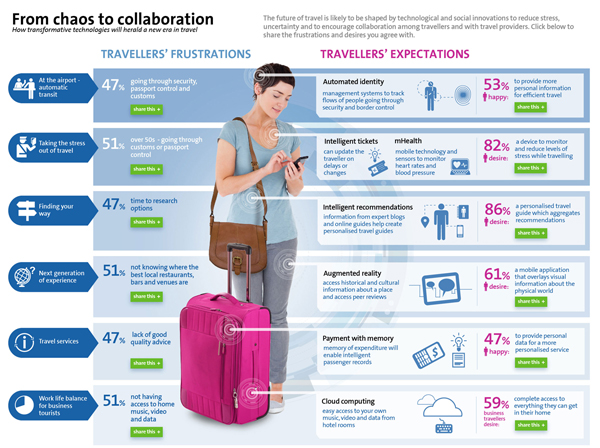6 ways tech will change travel: Amadeus

Collaboration and 4G networks will be the key technology shifts in the travel industry between now and 2020, according to a study commissioned by Amadeus and developed by The Futures Company.
The report, "From chaos to collaboration: how transformative technologies will herald a new era in travel" (PDF), based on a survey conducted in July 2011 across Brazil, China, Russia, Spain, the United Arab Emirates, the UK and the US, highlights the needs of travellers and the ways in which the industry can meet those needs using technology.
According to the report, there will be six areas in which travel will change in the coming years.
1. Faster mobiles
"The industry is starting to realise the impact that mobile will have on the trip experience. The fact that literally everyone within three to five years will have the rough equivalent of an iPhone or a lightweight smart device will profoundly change the way your trip actually takes place," said Denis Lacroix, vice president of Product Development, Sales and e-Commerce Platforms at Amadeus.
Some of the technology concepts that the most people surveyed found appealing are aimed at smartphones; augmented reality, two-way translation apps, integrated travel services from front door to destination and location-based apps.
"The mobile in our pocket gives us more flexibility and more freedom — because it's able to tell us so much," the report said.
Faster 4G networks will provide more secure access to the internet, and better support for multimedia, according to the report.
"Forecasts vary, but it is likely that by 2016, we'll see mainstream adoption of 4G across many Western countries, with a significant proportion of the population using 4G mobile networks, and the remainder largely using 3G multi-touch devices."
2. Automatic transit
Respondents to The Futures Company survey said that they hope for a more automated check-in method, such as face recognition and artificial intelligence.
According to the report, 60 per cent of frequent business travellers said that "they are happy to provide more personal information in return for more streamlined and efficient travel (compared with 43 per cent of leisure travellers)".
"Manual check-in security will be replaced by faster and more efficient systems that track flows of people," said the report.
However, there may be a number of barriers to improving the technology behind check-in and passport processes.
"The critical enabling technological factor is not the new technology itself, but the systems, infrastructure and business models that allow it to take root among a large enough group of people to create a positive network — or domino effect — and make it a standard part of the transit process."
3. Integrated payments and data
Travellers may soon pay for products and services via their mobile phones, eliminating the need to withdraw foreign currency, according to the report. The report further stated that those transactions will leave "digital breadcrumbs" that could be used by business travellers as receipts for travel expenses, and for travel providers to use as a customer-profiling tool.
"All data on travel-related payments will be integrated, acting as a memory of expenditure and activity for individuals, groups and travel businesses. This will provide a rich layer of data on travel-related activity, a trail of digital breadcrumbs, tracing where we've been and what we've done."
4. Intelligent recommendations
The way in which recommendations will become more "intelligent" will be due to advances in the way data is presented online and integrated with peers, experts and search engines, according to the report. "A social search engine should be able to direct you towards the relevant experts and recommendations from people with similar tastes."
5. Stress-free travel
While the travel industry can create apps to make transit bearable, surveygoers said they just want their trips to be made easier and hassle free.
One respondent said, "What actually could/would reduce my stress levels while travelling are all external factors, like: a) is my fight on time; b) was I able to check in without a hassle; c) will I be able to get through the security line quickly; d) is my seat comfortable ... am I sitting next to a weirdo... e) are they actually serving decent food in a timely manner, etc. Unless the devices were magically able to fix these things, I honestly would have no interest in it."
Tools such as "sensor-enabled 'intelligent luggage'", which lets travellers know where their luggage is at all times, and "intelligent tickets" that let the traveller know if there have been any changes to their flight can assist with reducing stress, according to the report.
6. The business "tourist"
While there are various kinds of communications software on the market making travel less necessary for work, such as videoconferencing, there is still the need for face-to-face meetings, according to the report. When they do travel, business travellers will want to combine pleasure with business, and will expect travel operators to facilitate this.
Cloud will be more predominant, as the need arises to access data from afar, with 59 per cent of business travellers saying they want a "home away from home".
"People want new experiences, but they also want to be able to access their music, video and data from their hotel rooms. They want complete access to everything they can get in their home, seamlessly brought to them," said Tim Jones, co-founder of Future Agenda and innovation, growth and futures expert.
The report also pointed to other tech that hotels could provide to their patrons, such as augmented-reality apps and audio tours that combine local culture and experiences for visitors.
